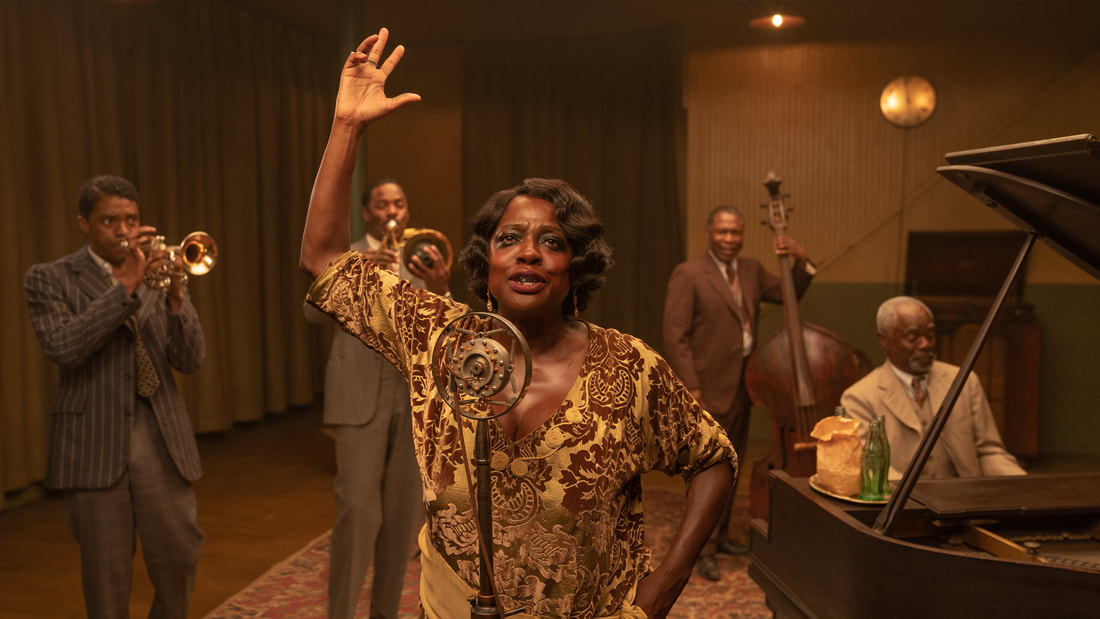|
By Nadia Dalimonte Chadwick Boseman, Colman Domingo, Viola Davis, Michael Potts, and Glynn Turman in Ma Rainey’s Black Bottom (2020) Creative tensions are rising at Hot Rhythm Recordings. This recording studio in 1920s Chicago is where the majority of Ma Rainey’s Black Bottom takes place. The film is directed by George C. Wolfe, written by Ruben Santiago-Hudson, and based on August Wilson’s Pulitzer Prize winning play of the same name. Wilson wrote his 1984 play after listening to Ma Rainey, known as Mother of the Blues, sing the titular song. Wolfe’s adaptation is an engaging portrayal of Black artistry and the economic exploitation of performing in an industry that centers white people (white men in particular). Ma Rainey’s Black Bottom has one of the best film ensembles in recent years and features a career-best performance by Chadwick Boseman, a remarkable talent gone far too soon.
The story begins with a lineup out the door of a show in Barnesville, Georgia. Ma Rainey (Viola Davis) is introduced mid performance. As Ma states later on in the film, what counts most for her is the voice inside, not what people think of her. It’s a great choice to establish this character on stage, focusing on the power of her voice, which Davis embodies so wonderfully. After getting a glimpse of Ma Rainey’s talents, the setting switches to Chicago where the four musicians in her band arrive at a recording studio and wait for her to join them. Irvin (Jeremy Shamos), who helps run the studio and constantly assures his co-worker Sturdyvant (Jonny Coyne) that everything is under control, leads the musicians to rehearse in a basement room until Ma arrives. A great deal of the film takes place in this room, and the dynamics that play out are nothing short of emotionally riveting. The framing and focus on the quartet create an all-encompassing feeling of being in that room, watching the actors from up close on a stage. Accompanying Ma Rainey is the quartet of Levee (Chadwick Boseman), Cutler (Colman Domingo), Toledo (Glynn Turman), and Slow Drag (Michael Potts). As the youngest of the four, Levee is playing trumpet in the group until he can make his own way on his own terms. “I’m my own person,” Levee says. In a room full of veteran musicians who play their piece without showing critique despite all the exploitation, his rage and energetic ambition are on the rise. Levee is such a compelling character to watch; Chadwick Boseman brings an enormous spark to the film in his portrayal of ambition and trauma. In the actor’s last film, he delivers an absolutely magnificent performance showcasing his uniquely compelling talent. Boseman elevates a great film into something even greater with his extraordinary screen presence. He works beautifully with the other actors, especially when his character is in conflict with Domingo and Turman (both also excellent in this film). It’s one of the most riveting performances in some time, another example of how the legacy Boseman left behind in film (among so many more spaces) will live on forever. The dynamics beyond the basement of this recording studio are not as engaging to watch unfold. This has more to do with the pacing and screenplay than the acting, as Viola Davis gives a brilliantly complex performance. Easily one of the most talented actors working today, Davis pours her heart into Ma Rainey and delivers with such fascinating embodiment. It would have been interesting to spend more time with her character on a deeper level; the film feels a bit fragmented when the focus switches to Ma and her relationships, not only with her band and the studio but also with Dussie Mae (Taylour Paige). Davis still opens a window to all of these dynamics and brings an immaculate level of detail to exploring her character. With the limited number of sets and framing, Ma Rainey’s Black Bottom shines as a character-based story with an incredibly talented ensemble. The actors guide the way through stunning monologues and compelling interactions, revealing more about who their characters are as individuals and in relation to the world they are living in. George C. Wolfe does a wonderful job establishing the sets and adapting the stage material in a way that feels invigorating instead of strained. Each of the performances soar in their own way and add many resonating layers to a story that explores ambition and artistic erasure.
0 Comments
Leave a Reply. |
Archives
June 2024
Categories |


 RSS Feed
RSS Feed